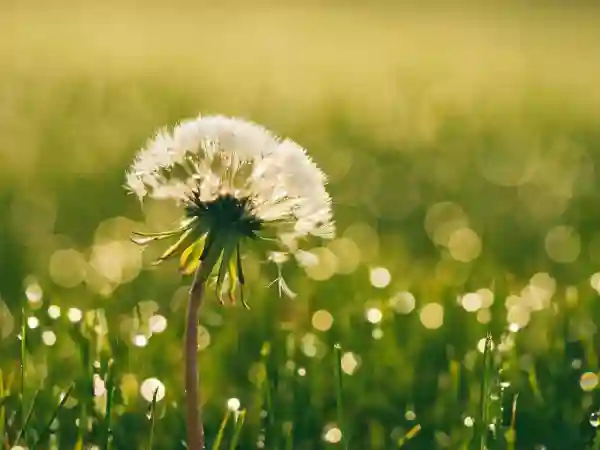

Natural remedies for hay fever
Spring and summer are a wonderful time of year. We’ve made it through a long and cold winter and the sun is starting to shine again (hopefully). The once bare landscape makes way for tender buds and glossy greens – an awakening for all of nature, including ourselves. For those of us who suffer with hay fever, spring and summer can symbolise a time of apprehension as we prepare for the increase in pollen.
Luckily, help is also at hand with some of nature’s finest remedies:
Turmeric & Ginger : Naturally hot, spicy and stimulating, these herbs either in combination or separately will stimulate the system, warm the digestion and improve nutrient assimilation. The combination of these two herbs is a specific remedy for allergic rhinitis, hay fever and colds. Histamine is by nature inflammatory, so adding plenty of anti-inflammatory spices into your diet could be helpful in alleviating nasal swelling. Both of these herbs can be found in our Turmeric Active tea and Three Ginger tea.
Nettle: Nettles are thought to have the ability to block histamine activity and other pro-inflammatory molecules involved in hay fever. Pukka Herb’s Cleanse tea contains nettles and aloe vera which has a natural cooling effect, helping to calm any irritation. Histamine, a key player in allergic response, is broken down by the liver, so supporting liver function with cooling and cleansing herbs can be helpful for managing hay fever symptoms. Pukka’s Clean Greens Superblend is a combination of 11 nutrient-dense plant superfoods including nettles, chlorella and spirulina, which can be taken in the lead up to Spring to ease the symptoms of seasonal allergies.
Mushroom gold: All medicinal mushrooms are rich in beta-glucans, powerful polysaccharides renowned for their profound effect on the immune system and on inflammation. The symptoms of hay fever are often caused by an over-response of the immune system within local tissues. Medicinal mushrooms are known for their immune-balancing properties, which help to retrain the immune system to have a more appropriate response to potential allergens.
Reishi mushrooms, known as the ‘King of Mushrooms’, display strong anti-histaminic and anti-inflammatory actions. It can be taken daily to support allergic conditions and reduce the symptoms of hay fever. In addition to their immune modulating properties, mushrooms contain significant levels of vitamin D2. Low vitamin D status is linked to development of allergies, so mushrooms can provide a helpful boost of vitamin D throughout the year. Pukka Herb’s formula contains reishi, maitake and shiitake for maximum benefit.
: A traditional Ayurvedic formulation that is particularly effective at detoxifying and cleansing a congested digestive tract. It will often work best when taken at night.
Peppermint & Licorice : An excellent herb for releasing stuck congestion and mucus around the nose and a ‘heavy head’. Licorice soothes the lung and throat and acts as expectorant.
: A natural cooling anti-inflammatory, soothing hot and irritated mucus membranes throughout the body. It’s a natural way of cleansing your liver and helping to reduce allergic response from the immune system. Organic Aloe Vera does not contain sodium benzoate, that is so often a causative factor in allergies.
Elderflower : The elder tree is traditionally known as ‘’nature’s medicine chest’. Elderflowers can dry and tone mucous membranes which line the nose and throat, reducing sneezing and a runny and blocked nose from hay fever. A comforting herbal tea such as Pukka’s Elderberry and echinacea tea could provide relief from those irritating symptoms throughout hay fever season. It contains elderflowers, elderberries and licorice which are rich in anti-inflammatory properties and have a soothing effect, helping to reduce any feelings of irritations in the nose and throat. Drinking 1-2 cups of elderflower or licorice tea may to help reduce the symptoms of mild hay fever during those particularly troublesome weeks.
Chamomile : A chamomile inhalation (steaming hot water) could be helpful technique for those suffering with hay fever in high pollen season. It works by clearing excess mucus from the lungs as well as reducing inflammation.
Vitamin C : Well known for supporting the immune system, it is thought that vitamin C may help to reduce histamine levels. In order to support the balanced functioning of your immune system, consider taking a vitamin C supplement with bioflavonoids to help reduce the severity of hay fever symptoms. Pukka Herbs and capsules contain organic plant-source Vitamin C rich in bioflavonoids and polyphenols which optimise absorption and bioavailability of this important nutrient.
Other diet and lifestyle tips to help ease hay fever symptoms
For 3-5 days drink plenty of hot water with grated fresh or honey, this will help to digest toxins and regulate digestion.
Favour foods that are warm and nourishing but easy to digest such as soups, grains and leafy green vegetables.
Minimise the time you spend outside on high pollen count days.
Keep windows closed at night when you sleep.
Avoid substances which are mucus producing such as dairy products, wheat and sugar.
Wash your face and hands after being outside.
Dry washing inside on a high pollen count days.
Use a saline nasal spray to rinse out your sinuses, at least twice a day.
Why does hay fever occur?
Hay fever is often seen as a reflection of the change in seasons that occurs during the transition from winter through to spring. As the warmth of spring increases, it also warms the body influencing a ‘melting’ of congestion and toxic accumulation that has occurred over the winter period. Hay fever is an allergic reaction (an immune system overreaction) to pollen released primarily by grasses, but can also be triggered by pollen released from trees. You can have an allergy to tree, grass, or weed pollen, which all have different times of release throughout the year, with grass pollen allergy being the most common.
Pollen particles contain a protein that causes inflammation, irritation and swelling of the nasal passages, but can also affect the eyes and the throat. The pollen causes the release of a substance known as an inflammatory mediator called histamine. It is the histamine that influences the symptoms of ‘hay fever’ in the body such as sneezing, itchy and watery eyes, swelling and inflammation of the nasal passages.
The symptoms of hay fever can often be split into two categories:
Sinus congestion, watery eyes, copious mucus, itchy nose
Red eyes, itchy eyes, inflamed nose and mucus membranes, headache
These are a reflection of our current state of health. Those of us who are more prone to mucus accumulations will tend to suffer more from runny eyes and nose. Those who perhaps have a greater tendency towards hot, irritated and itching skin conditions will suffer more from itching and red eyes, ears and throat.
To minimise hay fever symptoms, start taking natural remedies 2-3 months before the pollen season kicks in as the beneficial properties of the plants need time to take effect on the body.
However, for those that are susceptible and highly sensitive to hay fever attacks, it’s best practice to start hay fever support during the winter before the trees and blooms begin the bloom.
Hay fever and the doshas
Since all of us have a different dosha (or mind body type) hay fever symptoms will also differ from person to person. Ayurveda also differentiates hay fever symptoms according to a person’s dominant dosha:
Vata types (or those with aggravated vata) are more prone to symptom wheezing, sneezing, headaches, and dryness of the mouth and throat.
Pitta types (or those with aggravated pitta) often experience more eye irritation, with burning, inflammation and a sore throat, with the potential for fever and hives too.
Kapha types (or those with aggravated kapha) experience more congestion, with runny noses, sinus infections, itching along with feelings of heaviness.
Since symptoms vary according to the dosha involved, following the right diet for your (or dosha imbalance) can be very helpful.


Author: Saf Hareshe
Herbal Education Specialist
Saf is a qualified Nutritional Therapist from the College of Naturopathic Medicine and runs a private clinical practice specialising in digestive health. She delivers herbal education both internally at Pukka and externally to our partners and practitioners and is passionate about making herbs and nutrition exciting and accessible for all.
Years of experience
1 year
Professional registrations
DipCNM, mANP, mGNC
Qualifications
Qualified nutritionist (College of Naturopathic Medicine, 2021)

